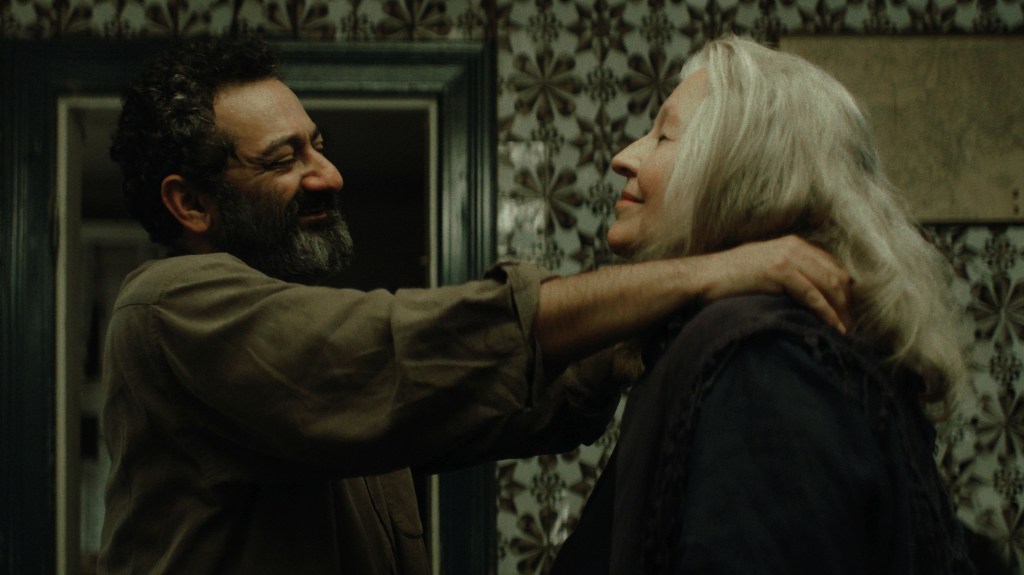Opening a film with a line of poetry is always a problematic way to start: the words are quickly forgotten once the visuals begin, making the verses far more meaningful were they before the final credits. In the case of Yunan, the words come from the Abbasid poet Al-Mutanabbi and they speak of craving a person’s presence, yet even when together, “the distance will still linger between us.”
It’s an apt line for the film, both in terms of the inability of the main character to bridge both metaphorical and physical distances, and in the way Ameer Fakher Eldin’s atmospheric sophomore feature keeps the audience at a certain remove, refusing clear-cut explanations or simple emotional catharses. Suffused with a melancholy as saturated as the damp air of the North Sea, Yunan follows on from Fakher Eldin’s ultimately more affecting debut The Stranger with its exploration of another facet of exile and belonging, this time set on a flood-prone German island that exists in a perpetual struggle between evanescence and permanence.
The title should not be confused with the Chinese province Yunnan; in this case, Yunan is the Arabic name for Jonah (also known as Yunus), the prophet swallowed up and spit out by the sea beast, transformed and yet the same, much like the sparse island of Langeness where much of the film is set. Evocatively shot by Ronald Plante, Yunan is an ideal calling card for the D.o.P. since it’s his cinematography, alongside Suad Bushnaq’s minor-key score, that most effectively communicates the protagonist’s mournful state of exile, battered, at times transformed yet always fixed in its immutability. This is unmistakably European art house cinema, notwithstanding the director’s Palestinian/Syrian roots, complete with a sort of white German savior in the form of Hanna Schygulla, which means its post-festival chances lie largely on the continent.
Munir Noureddine (George Khabbaz) is plagued by shortness of breath, which a doctor recognizes as stress. “Take a few days off,” he suggests, “go for a walk,” as if either of those pat fix-its could counter what ails him. Depressed, unable to get on with the novel he’s writing or sexually perform with his lady friend Sarah (Laura Sophia Landauer), Munir carries with him the weight of exile, made more acute by calls back home to his sister and mother (Nidal Al Achkar), the latter suffering from Alzheimer’s. Munir’s novel is meant to be based on a story his mother used to tell, about a cursed shepherd (Ali Suliman) who “had nothing at all. No mouth, no nose, no ears. Only a big herd of sheep and his heavy-hearted wife” (Sibel Kekilli).
We hear these lines often — rather too often — and while the shepherd story is designed to be enigmatic, it’s so fraught with dejected mystery that it becomes a burden to the narrative. Yes, we understand that Munir’s mother’s inability to recall not only the full story but even the shepherd’s name is itself a reflection on the state of exile and the yearning to grasp onto memories whose details keep slipping away, yet the tale’s continued recurrence feels like an ill-judged distraction despite being the only element in the film that directly connects to Munir’s unnamed homeland.
Unable to lift himself out of his depression, Munir takes a ferry from Hamburg to the isolated island of Langeness, off the coast of Schleswig-Holstein, presumably because it’s a suitably lonely place to kill himself with the revolver he’s packed. He checks into the guest house of the only hotel on the island, run by Valeska (Schygulla), and wanders the flat, exposed pastures, punctuated by solitary homes built upon small mounds. Valeska is exactly what you’d expect a guest-house owner played by Hanna Schygulla to be: no-nonsense, wry, given to few words and warm-hearted. In contrast, her alcohol-fueled son Karl (Tom Wlaschiha) is harder and unfriendly to outsiders.
A once-in-a-generation storm is brewing, and with it the warning that “the firm ground on which we stand now will be at the bottom of the sea.” Only the mound-set homes might escape being temporarily reclaimed by the waters, but just as Kirsten Dunst’s character rises from her despair in Melancholia as catastrophe nears, so too the approaching floods slowly edge Munir away from suicidal thoughts. As the ground becomes submerged and then reappears, water-logged, altered yet resilient, so too Munir rises from his inner darkness, still carrying the burden of exile but able to continue his existence, more accepting of his impermanence in light of a greater concept of home.
What are we ultimately to make of Valeska’s character, apart from providing a much-needed counterweight to Munir’s heaviness? She’s the one whose words about the firm ground become metaphorical allusions to exile, she’s the person who tells Munir he can alleviate his breathing panic attacks by gulping down less air, not more. While we’re meant to dismiss the offscreen doctor’s advice about taking some time off, placing it in the category of yet another white man telling someone from the Global South how to live better, isn’t that what Valeska is also doing? Another white savior helping a traumatized Arab man by giving advice for a situation she’s never personally experienced?
Far less open to misinterpretation is Plante’s painterly images, hauntingly using the water’s reflections, infinity horizon and the enormous scumbled grey sky as a physical manifestation of Munir’s turmoil. Multiple scenes stand out, such as one before the storm arrives, when Munir stands in a pasture being stared down by a herd of cattle whose tense wariness heightens the man’s sense of being an outsider. Also memorable is an earlier image while still in Hamburg, in Sarah’s apartment, where the passing trains through the window underline the overall feeling of transience. Less successful because so very predictable is a scene where Valeska — in what can only be a fantasy —puts on a song by the Lebanese singer Hassan Abdul Nabi and Munir dances in front of the villagers.
Title: Yunan
Festival: Berlin (Competition)
Director-screenwriter: Ameer Fakher Eldin
Cast: George Khabbaz, Hanna Schygulla, Ali Suliman, Sibel Kekilli, Tom Wlaschiha, Nidal Al Achkar
Sales agent: Intramovies
Running time: 2 hrs 04 mins



